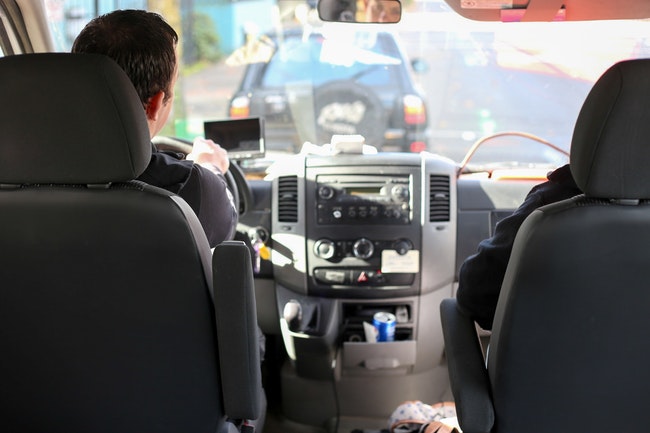 Brenton Gicker, left, prepares to pull CAHOOTS van toward a 911 call at Eugene Public Library.
Brenton Gicker, left, prepares to pull CAHOOTS van toward a 911 call at Eugene Public Library.
The city of Salem paused its plans to start a program where mental health workers respond to some crisis calls, rather than police.
The program was intended to run through United Way of the Mid-Willamette Valley and received broad support from Salem residents who testified as the city was planning its budget for the coming year.
But city plans hinged on receiving state money that’s no longer directly available to them.
The House Behavioral Health Committee in January voted unanimously in favor of HB 2417, which would provide matching funds to cities for mobile response units through a competitive grant process.
Salem city councilor Vanessa Nordyke said a change in the bill during the legislative process required counties – no longer cities – to request a piece of the $10 million the state allocated for crisis stabilization services, and cities could in turn ask for money from their respective counties.
“As I understand it, there is no such interest from the Marion County commissioners,” Nordyke said.
Commissioner Kevin Cameron, who serves on the United Way board, said county officials are not opposed to pursuing mobile crisis teams, and that United Way and its partners tabled their previous plans for now as county officials discuss other options for public safety.
“What happened is that one person was pursuing a certain model that doesn’t fit with what we’re doing,” Cameron said. “So we took a step back with the city of Salem, our Public Safety Coordinating Council, and said, ‘Hey, what are the gaps?’”
Marion County Undersheriff Jeff Wood said county officials didn’t want to pursue a program that overlapped with or didn’t complement existing efforts. Those include the sheriff’s office’s Law Enforcement Assisted Diversion program, which connects people who commit low-level crimes with social services rather than the criminal justice system, and the multi-agency Mobile Crisis Response Team, which pairs police with mental health workers to respond to crisis calls.
“I don’t want to make it sound like we’re putting the kibosh on anything,” Wood said. “I think we’re just trying to make sure that we have a complimentary array of services to address the homeless population, those who are suffering from addiction and mental health issues.”
Nordyke, who has been a vocal supporter of a mobile crisis unit, said the city no longer being able to directly apply for the state funding is a roadblock, but she’s not willing to give up on pursuing the service.
“I’m going to keep looking into potential options to find a way, because the community has made clear they want this,” she said. “I’ve been clear from the get go, this is all about adding to the spectrum of public safety services, funding this in addition to funding police and fire, allowing lower priority calls to go to a crisis unit.”
The Salem Budget Committee in May unanimously voted to set aside $135,000 for a mobile response unit that would send a crisis worker and EMT instead of police to calls reporting people in mental health crisis.
But that estimate was still hundreds of thousands of dollars shy of what was needed to start the program, as a proposal by United Way estimated $542,000 for a 16-month pilot.
Salem residents for years have expressed support for a local crisis response, with nearly 100 people writing to the budget committee asking members to recommend funding for a program and more than a thousand signing a petition.
A similar program in Eugene, CAHOOTS, in the past year has received national attention as more U.S. cities look for alternatives to law enforcement responding to mental health concerns.
“I would very much like an opportunity to sit down with the county commissioners myself and explain to them why I believe this will serve all the people of Marion County,” Nordyke said.
Oregon will get around $1 million in federal dollars to help fund non-police response teams to assist people who have mental health crises outdoors, the Biden administration announced this week.
“I will need to talk to our community partners and see what options there are,” Nordyke said. “I understand there may be federal funding coming our way, and who knows? Because, of course, the federal legislature is its own animal.”
Contact reporter Ardeshir Tabrizian: [email protected] or 503-929-3053.
JUST THE FACTS, FOR SALEM – We report on your community with care and depth, fairness and accuracy. Get local news that matters to you. Subscribe to Salem Reporter starting at $5 a month. Click I want to subscribe!
PRIOR COVERAGE:
Mental health workers, not police, could be responding to calls in Salem by August
Salem Budget Committee recommends funding for mobile unit to respond to crisis calls
Salem residents call for a crisis response team in city budget
‘You want a resolution as much as possible’: Six hours with Eugene’s mobile crisis intervention team
Salem nonprofits looking at Eugene’s model for mobile crisis response










